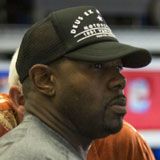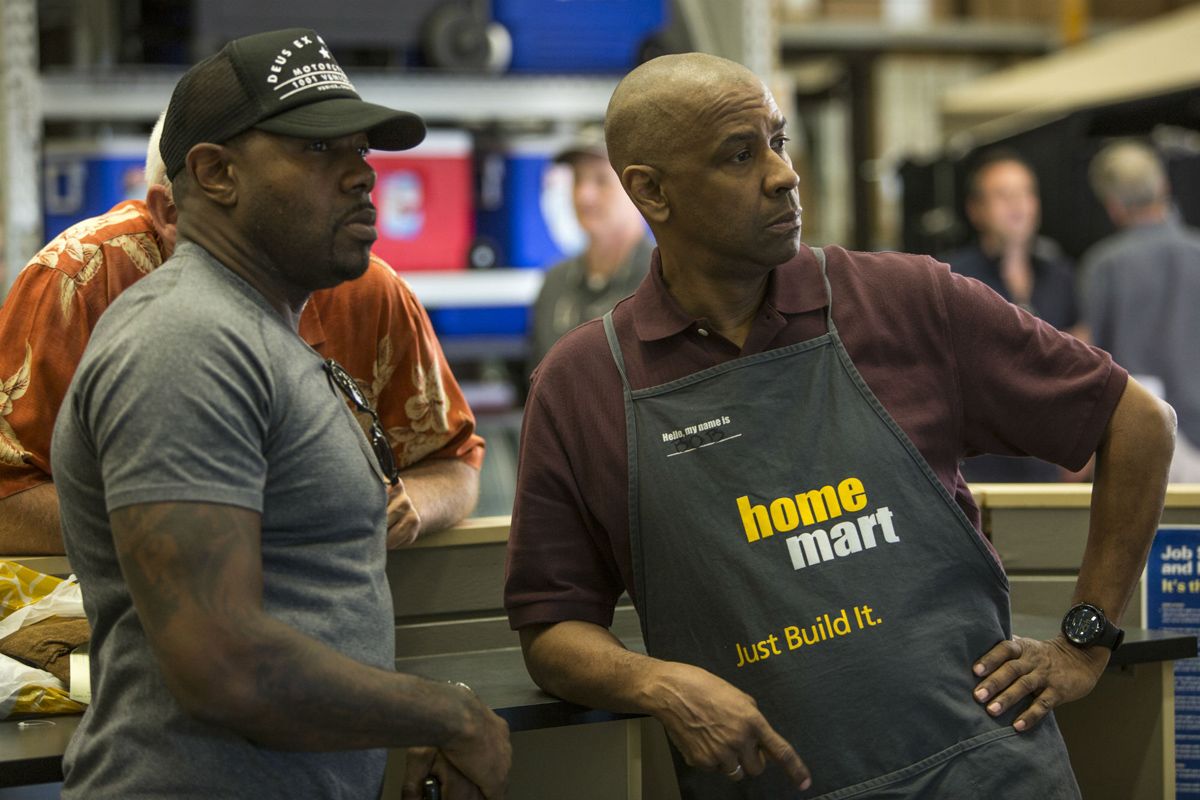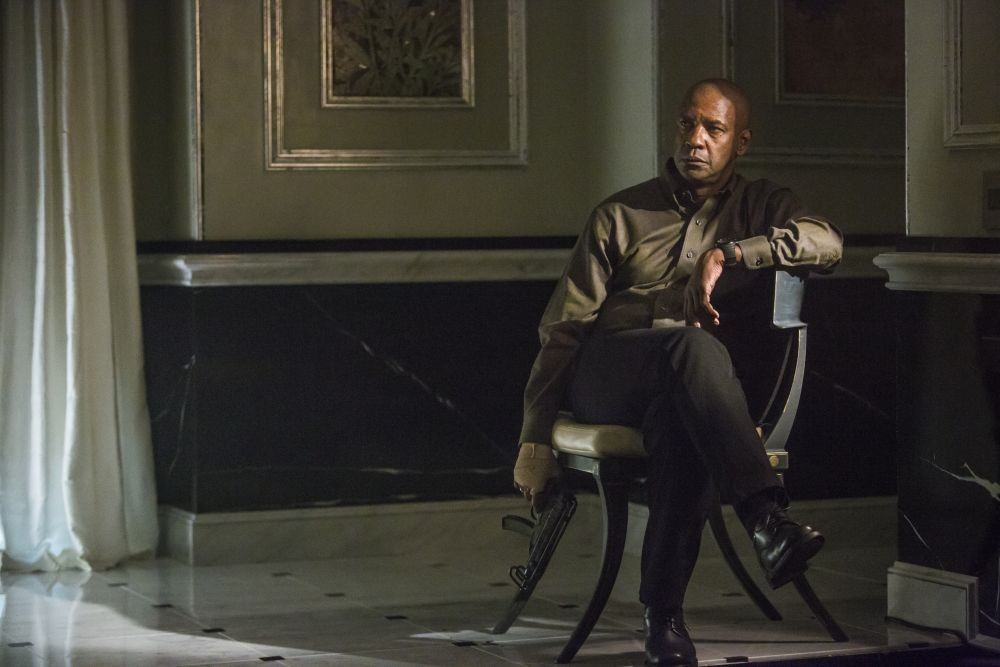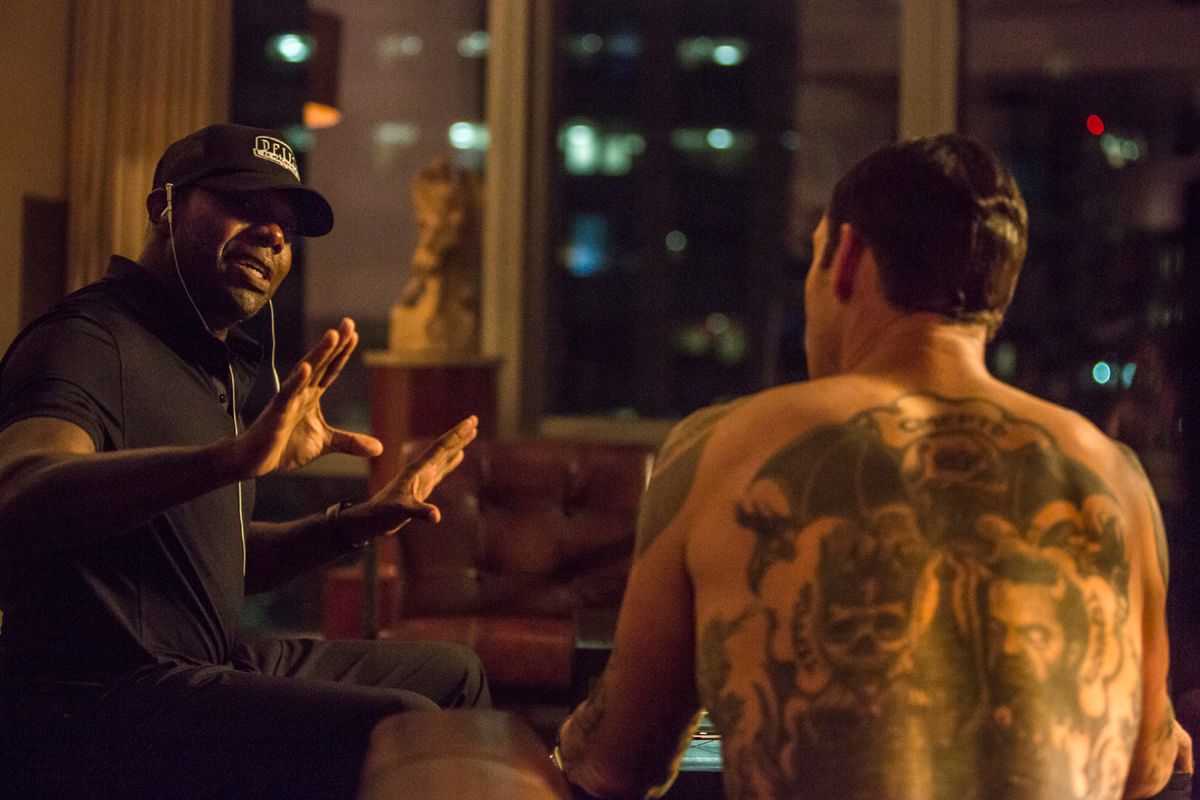Although he had every intention of delivering big action beats – explosions, strafing bullets and brutal smackdowns – to his big-screen reimagining of the ‘80s TV staple The Equalizer, director Antoine Fuqua also wanted audiences to sit with the film, soak up the story and get to know the new Robert McCall.
Hoping to catch some of the more atmospheric and character-driven spirit of the ‘70s films he admired growing up, Fuqua (Brooklyn’s Finest, Olympus Has Fallen) reteamed with actor Denzel Washington – some 13 years after their initial collaboration on Training Day, which ultimately earned Washington his second Oscar – to craft a McCall for a modern era: He’s still a highly skilled former covert operative, but one living quietly under the radar as an employee at home-improvement store, until his deeply rooted moral compass spurs him into action when a young woman who frequents the same diner as he does (Chloe Grace Moretz) runs afoul of Russian mobsters.
In a conversation with Spinoff Online, Fuqua reveals the inner workings of reuniting with Washington after so many years, bringing a classical take to the contemporary action movie, and what he was watching on TV in the ‘80s instead of The Equalizer.
Sinpoff Online: What was your way into this project, the element that made you say, “This is one I know I can pick up the ball and run with”?
Antoine Fuqua: Well, Denzel was the first reason. When Denzel called me and said he was going to play the role and said I was right for it, I read it and said, “OK, I get it. I can see him.” That's always the first that I could see Denzel playing that role. The other one was that Richard Wenk wrote a really good script, and it wasn't complicated, It wasn't trying to be something it's not. I thought that that was a good thing. So it gives us room to play. And so for me, I got excited about that. And when I sat with Denzel and Richard, Todd Black and Jason Blumenthal, it was a sense of freedom. They were like, “What kind of movie do you want to make?” I was like, “I want to make a movie that's kind of a throwback to the ‘70s. There was a classic storytelling and a little more of a European style than today.” Everyone said, “Go – make your movie.” I thought, how could I say no to that?
You and I are about the same age, and I remember when the show aired but I have never seen an episode of the original series. Did you have any personal connection to it yourself?
I'm happy to hear that, because everyone asked me about that! My mom watched that show. My grandmother watched that show. I was watching Miami Vice, you know? I was watching Crockett and Tubs in Ferraris driving down the street. My fantasy was not the old guy in the Jaguar driving down the street – it was the other guy. But I remember seeing it a few times, like in my memories. And I do remember – and it's so bizarre how things work – sitting there watching with my grandmother one day, and he was doing the right thing. He was helping people, and he never asked for anything in return. And I remember watching it, and I thought that was cool. And that always kind of stuck with me: the sense of justice in that way without reward for the individual who did it. And so when I read the script, I thought the heart of it is still the same, and it's more of an origin story to me. And I thought, “That story's worth telling.”
The first time you worked with Denzel, he had this big, explosive, ferocious role in Training Day, and this role is the exactly opposite: cool, controlled, close to the vest. Tell me about watching Denzel do an entirely different character – a whole different style of acting. What was that like for you to work with him on that kind of tone?
It was exciting because Alonzo was so wild. The energy of that character, he's so intense, and then this guy, he was intense in a completely different way, almost damaged in a different way. So it was great to do it. When I read the script, I thought, this would be good for it because it's so different. But after Training Day, you get a sense of everything thrown at us was similar to that type of guy. And then nobody wanted to do that again. He already did it. He got an Academy Award for it. So to me, it was better to do something that was really completely opposite.
Review: "The Equalizer" Delivers Entertaining, Excessive Action and Little Else
It's been a while since the two of you have worked together. In what ways was it like no time had passed, and what ways did you have make new discoveries about the way the other worked?
Well, the first day of shooting on a set was like no time has passed because of the rhythm – just the rhythm of it. We just picked right up, and sort of in a different way in that we didn't have to say a lot. We understood it. I think the new discoveries, I guess if I was going to say a new discovery, was – but again, this is tricky because of the environment, he was really much calmer and I was too. Little more quiet, more calm – the both of us. But Alonzo, the character he was playing [in Training Day], was a whole different character. That guy would go down to the neighborhood. There were gangs and everything going on, and I would get ready to set up a shot, and he'd be sitting on the porch with the whole neighborhood, laughing and having a great time with the kids all around him and stuff, and then he'd come over and we'd get into the scene. It was a different rhythm.
And this movie, he would sort of go sit by himself sometime quietly, or he'd go eat lunch with the whole crew every day. He ate lunch with the crew every day. He was a whole different energy. So I guess more calm for both of them, for the discovery. We both had been a little more comfortable, a little more calm. And it also comes from Training Day, during that process, we trusted each other because we were in it. He would never look at my monitor. Denzel, one day I asked him after I did a couple scenes, did he want to come look at the monitor and just take a look and see. He said, “I'm good – we can move on.” And then he said, “You're fine. The time to be afraid is when the plane's on the ground. You're the pilot. Call me when you're ready,” and walked away and went to his trailer. And it's been that way from then to now, and that was like the first day or two of shooting for Training Day. So that sort of comfort level helps us a lot, and there's a certain calmness to that, a certain trust there, so I guess that's it. We were both much calmer, much more at ease. He knew me now. He knew I was going to deliver and be ready, and I know he's going to show up and be ready. That's a given.
When I saw the film, the audience was really into those sequences where we see McCall being so cool and methodical in how he enacts every part of his plans. Tell me about making that cinematic because I'm sure that was kind of a challenge to making that calmness work in an action movie.
Yeah, I think the thing for me was shooting it more like a narrative, if that makes any sense. Because he's such a powerful actor, for me, it's more like a narrative. It's more like not thinking about it in an action scene and shooting it more or less as if my camera was another leading man in the scene – where you would actually witness each piece of action, and you would see exactly what's going on from an angle that was true to environment. And what I mean by that is I didn't shake the camera around. I didn't do a whole lot of hand-held stuff like that. I kind of did it where it was almost more classic storytelling, so it settles you a little bit more. But it's like a Caravaggio painting or a Delacroix painting, where it's really a violent image of a war or a battle or a head being cut off, like Caravaggio, but yet the picture's so beautiful, you can't stop looking at it. And that's just my influence of movies. I grew up watching all the ‘70s films and stuff like Apocalypse Now -- that's one of the most beautiful films ever shot, and The Godfather, where they're violent, but the camera's not getting in the way.
The actual look of the film was fantastic. Tell me about using Boston as a backdrop.
Yeah, well, I mean, [cinematographer] Mauro Fiore, we worked together on – how many movies now? He shot Training Day, Tears of the Sun, he shot this movie, we've done commercials together, he shot Avatar. So he's a great DP. He's a great cinematographer. Boston, we talked a lot about it, and it's so interesting because when I read it in the script, it felt so right because it's so blue-collar. It's such a blue-collar town, and it's such a place of mystery. It's such a place that has a lot of texture to it. So when I went scouting in Boston, I fell in love with it. I fell in love with just shooting it because I thought it's an interesting place. It's got secrets. There's something about Boston for me that has secrets. Because you think of Boston, a lot of people think about Massachusetts and the harbor and those sort of things. But then you think about the Whitey Bolger story. You start thinking about the gangsters of that place. You start thinking about the edge that it has and the diversity that it has. It has a huge Latino community there, black community, Caucasian community, Indian community. It's so diverse, that it has a lot of secrets. So it fit McCall for me. It sort of sounds like McCall. He's a highly intelligent individual. Yet he has a lot of edge. And it makes sense.
You've worked in the comic book realm before. Do you have any interest in coming back and doing something on the page or working to bring a comic book on film?
I've had ideas in the past about it, but I don't have any great desire to dive into that right now. If I read something that just grabbed me and had the right moral compass about it, I'd love to do something that I could just really go nuts and have the freedom to have a guy go jumping, flying off buildings. That's always fun to do in the right context. I think like the Batman, The Dark Knight stuff was really cool. I'm sure my tone would be somewhere in that world, and I would even make it edgier. But that's me.
The next film from you we’ll be seeing is Southpaw. How did you change up your own game and challenge yourself with that one because that's something that people are pretty excited about? And Jake Gyllenhaal’s been on fire lately.
The boxing's going to blow you away, once you see that. It's boxing you've never seen before, and it's very real. And Jake is amazing in it. He transforms completely. The drama of a father, of a man learning to be a father, of learning to be responsible, is what I wanted to do more than anything. I wanted to try more stories, more dramas without guns and stuff like that. It always finds its way into it, but it's just really about telling an adult drama about growth. I have a kid now, so I'm going to do things different.
Had you and Denzel flirted with any other projects in the time between Training Day and this one?
We started with American Gangster; that one didn't work out. We talked about a few other things. But we both wanted to just find the right thing, the right environment, the right situation to work together again on. Neither one of us realized it was so long. It just kind of blew by us because he directed, I think, two movies since then, and that takes a couple years of your life. And then I've directed several movies – that took a few years of my life. So between myself and him, that's almost like eight years gone with both of us directing different films. Life moves quickly, man. We're going to do The Magnificent Seven now. We're going to do that next year, in March, so finally, I'm going to try to really continue on working together.
Tell me a little bit about what's got you charged up for The Magnificent Seven and the take you will be bringing to it.
Well, I grew up watching The Seven Samurai and Westerns, so for me, besides doing a gangster movie like Public Enemy, those are my movies that I grew up with, watching with my grandmother, you know. So for me, it's really personal, and a boyhood dream come true to be able to make a Western because they don't get made often these days. And I think it's great to do that. To do it with Denzel is even more special for me, especially the classic Seven Samurai and Magnificent Seven. So I'm excited about it. It's a dream come true in that sense. They have these challenges, but I plan on doing the same thing I did with Training Day with Magnificent Seven: I'm going to give it my own edge.
The Equalizer opens today nationwide.




